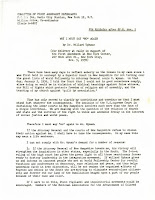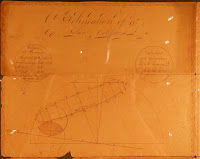 In November 1950, Willard Uphaus, religious educator and
executive secretary of the National Religion and Labor Foundation was invited
to attend the World Peace Congress in Warsaw as a member of the US delegation.
A committed pacifist, Uphaus had been warned that subversive elements, i.e.
Communists "were cynically exploiting the passionate desire for peace to gain
world domination" and that they would be dominating the Congress. Uphaus, however,
disagreed. He knew that churchmen, like himself, would be there as well as many
others who, despite being labeled "subversive," had a “deep and genuine desire
for peace.” The Congress went well and at the end of it, Uphaus and others had
the opportunity to visit Moscow through the Soviet Peace Committee. The trip
was an eye-opener for Uphaus, confirming in him the desire to work even harder
to foster American and Soviet friendship. Unfortunately, when he returned to
the States he found himself "the spinning center of a tornado, one of the
tornados spawned in the panic storm that culminated in what has become known to
the world as McCarthyism."
In November 1950, Willard Uphaus, religious educator and
executive secretary of the National Religion and Labor Foundation was invited
to attend the World Peace Congress in Warsaw as a member of the US delegation.
A committed pacifist, Uphaus had been warned that subversive elements, i.e.
Communists "were cynically exploiting the passionate desire for peace to gain
world domination" and that they would be dominating the Congress. Uphaus, however,
disagreed. He knew that churchmen, like himself, would be there as well as many
others who, despite being labeled "subversive," had a “deep and genuine desire
for peace.” The Congress went well and at the end of it, Uphaus and others had
the opportunity to visit Moscow through the Soviet Peace Committee. The trip
was an eye-opener for Uphaus, confirming in him the desire to work even harder
to foster American and Soviet friendship. Unfortunately, when he returned to
the States he found himself "the spinning center of a tornado, one of the
tornados spawned in the panic storm that culminated in what has become known to
the world as McCarthyism."
 As a result of his trip to Moscow, Uphaus was forced to
resign from the National Religion and Labor Foundation. He soon found another
outlet for his peace activism when he became the co-director of the American
Peace Crusade. Over the next several years he was “caught up in this great
movement, with the war in Korea "lending a terrible urgency” to his cause. And then
the World Fellowship of Faiths knocked on his door. Finding their mission
completely in sync with his own, he and his wife became co-directors of the
World Fellowship Center in Conway, New Hampshire in 1953. It was then that his
trip to Russia came to haunt him.
As a result of his trip to Moscow, Uphaus was forced to
resign from the National Religion and Labor Foundation. He soon found another
outlet for his peace activism when he became the co-director of the American
Peace Crusade. Over the next several years he was “caught up in this great
movement, with the war in Korea "lending a terrible urgency” to his cause. And then
the World Fellowship of Faiths knocked on his door. Finding their mission
completely in sync with his own, he and his wife became co-directors of the
World Fellowship Center in Conway, New Hampshire in 1953. It was then that his
trip to Russia came to haunt him. The case began with two critical articles about the Center
in the Manchester Union Leader in
September 1953; "Pro-Red Takes over New Hampshire Fellowship Group," proclaimed
one. In response, New Hampshire's Attorney General Louis C. Wyman began to
investigate the Center and in particular Willard Uphaus under the Subversive
Activities Act of 1951. Uphaus was subpoenaed twice in 1954. During his second
round of questioning he was asked to turn over the Fellowship's 1954 guest list
and the correspondence with prospective speakers. He refused: "I told the Court that I could not
in good conscience comply since doing so would be in violation of biblical
teachings against false witness, our Bill of Rights which protects freedom of
religion and assembly, and the teachings of my church against 'guilt of
association'."
The case began with two critical articles about the Center
in the Manchester Union Leader in
September 1953; "Pro-Red Takes over New Hampshire Fellowship Group," proclaimed
one. In response, New Hampshire's Attorney General Louis C. Wyman began to
investigate the Center and in particular Willard Uphaus under the Subversive
Activities Act of 1951. Uphaus was subpoenaed twice in 1954. During his second
round of questioning he was asked to turn over the Fellowship's 1954 guest list
and the correspondence with prospective speakers. He refused: "I told the Court that I could not
in good conscience comply since doing so would be in violation of biblical
teachings against false witness, our Bill of Rights which protects freedom of
religion and assembly, and the teachings of my church against 'guilt of
association'."
Uphaus felt that handing over the names "would make him a contemptible talebearer against people who, to his knowledge, had never done anything to injure the state or the country." For a while it looked as if the case could be resolved based on jurisdiction since Uphaus was a resident of Connecticut. However, on December 14, 1959, after several appeals, Uphaus was charged with contempt of court and sentenced to one year in in Boscawan Jail in Merrimack County, New Hampshire. He was released on December 11, 1960.
To learn more about Willard Uphaus’ legal fight and activism, his work with the Fellowship of Faiths, the National Religion and Labor Foundation, and the American Peace Crusade ask for the Willard Uphaus papers (MS-1077).


